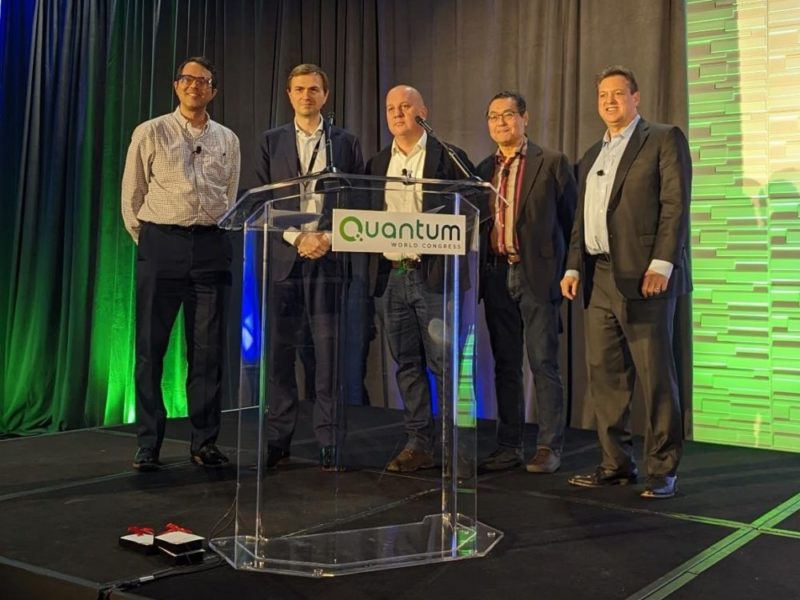The leadership of Manassas, Virginia-based SylLab Systems doesn’t want you to think about quantum as a far-off, hard-to-understand technology. It instead wants other company heads to think about how the tech will impact their security systems when it arrives.
Founder and CEO Bart Slowik created SylLab Systems, which is based on post-quantum cryptography — more on that below — to push peers into considering that exact future. Slowik started the post-quantum security startup, his second company, in late 2019 because he and his four-person team are “essentially privacy and cryptography enthusiasts” who recognized the challenge ahead once quantum systems reached their full potential. He expects that development within the decade, with computers still relying on existing security that’s not designed to defend against quantum threats. He thus created SylLab to secure the internet of today against future quantum threats by helping companies transition their cyberinfrastructure to a post-quantum world.
Post-quantum cryptography differs from cybersecurity through quantum key distribution; Quantum key requires quantum computers, which are still being fully built out. Quantum cryptography, on the other hand, is about securing the computers of today against future quantum attacks with algorithms.
“Cryptography is like a utility,” Slowik told Technical.ly. “So, basically, security is in anything that we do: Anything you write and say digitally is secured by cryptography in some sense. So that being threatened by quantum computers — it’s an enormous task in front of us.”
So far, SylLab has partnered with George Mason University and the University of Maryland’s Quantum Startup Foundry. It also received investments from Virginia Innovation Partnership Corporation, Prince William County, VentureScope, and Marl5G; was an Ignite Grant winner and took third place in the pitch competition held at the Quantum World Congress.
SylLab primarily works with large enterprises, Slowik said, because they have the most critical need. Within that, he sees defense and healthcare as the industries with the most urgent concerns, both in the private and public sectors.
“We care a lot about privacy and security,” Slowik said. “I believe that it’s is very important for us to have that security and privacy of the personal information that we share online.”
As the company grows, he’ll also be looking to expand into the financial industry. He additionally aims to have full implementation of the technology with clients in existing infrastructure. In the near term, he anticipates opening a funding round, likely sometime next year.
But for Slowik, post-quantum cryptography doesn’t stop with what his company is doing now. He sees many future applications in the supply chain, healthcare, the internet of things and more.
“It’s not only about post-quantum cryptography because it raises the security levels, but it’s also solving the problems of today,” Slowik said.

This editorial article is a part of Technology of the Future Month 2022 in Technical.ly's editorial calendar. This month’s theme is underwritten by Verizon 5G. This story was independently reported and not reviewed by Verizon 5G before publication.
Before you go...
Please consider supporting Technical.ly to keep our independent journalism strong. Unlike most business-focused media outlets, we don’t have a paywall. Instead, we count on your personal and organizational support.
3 ways to support our work:- Contribute to the Journalism Fund. Charitable giving ensures our information remains free and accessible for residents to discover workforce programs and entrepreneurship pathways. This includes philanthropic grants and individual tax-deductible donations from readers like you.
- Use our Preferred Partners. Our directory of vetted providers offers high-quality recommendations for services our readers need, and each referral supports our journalism.
- Use our services. If you need entrepreneurs and tech leaders to buy your services, are seeking technologists to hire or want more professionals to know about your ecosystem, Technical.ly has the biggest and most engaged audience in the mid-Atlantic. We help companies tell their stories and answer big questions to meet and serve our community.
Join our growing Slack community
Join 5,000 tech professionals and entrepreneurs in our community Slack today!

The person charged in the UnitedHealthcare CEO shooting had a ton of tech connections

From rejection to innovation: How I built a tool to beat AI hiring algorithms at their own game

Where are the country’s most vibrant tech and startup communities?



